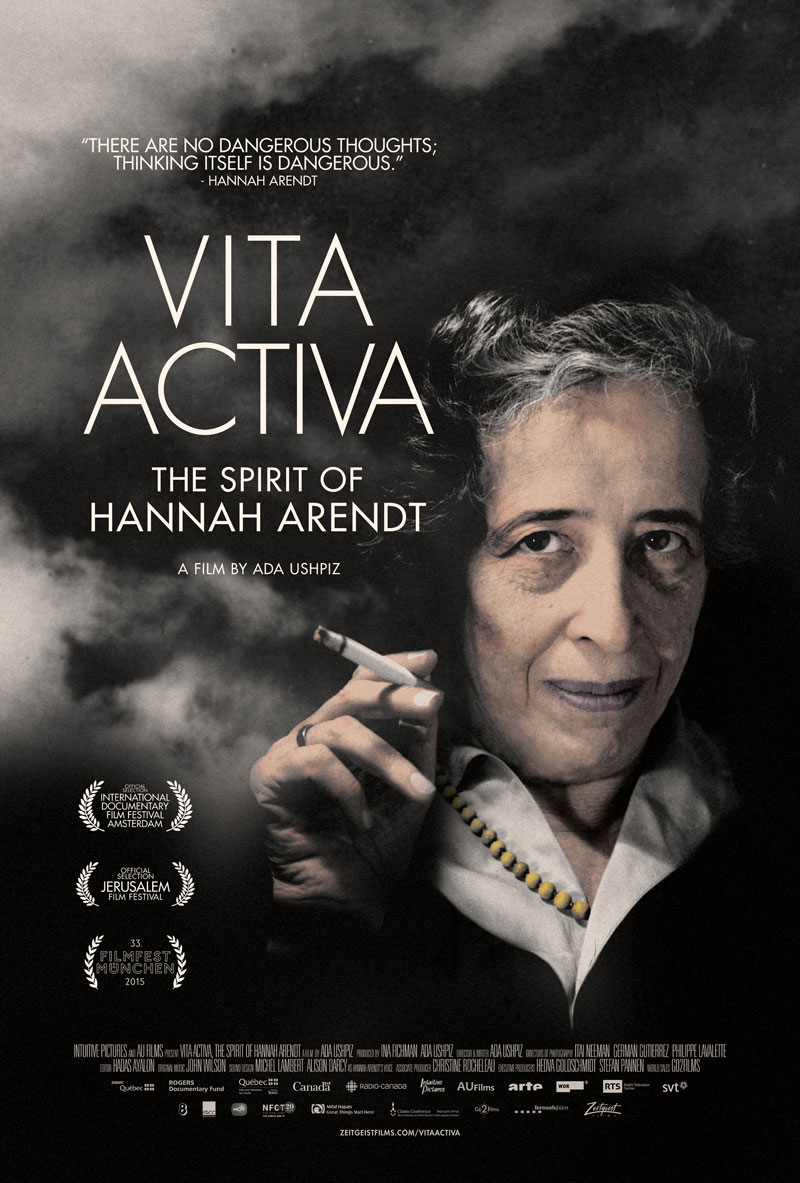Vita Activa: The Spirit of Hannah Arendt
While it will surely satisfy and provoke students of 20th-century intellectual history, [Vita] feels more urgent than most documentaries of its kind.
Vita Activa: The Spirit of Hannah Arendt
A brand new documentary about one of the most influential thinkers of the 20th century.
The German-Jewish philosopher Hannah Arendt caused an uproar in the 1960s by coining the subversive concept of the "Banality of Evil" when referring to the trial of Adolph Eichmann, which she covered for The New Yorker magazine. Her private life was no less controversial thanks to her early love affair with the renowned German philosopher and Nazi supporter Martin Heidegger. This thought-provoking and spirited documentary, with its abundance of archival materials, offers an intimate portrait of the whole of Arendt's life, traveling to places where she lived, worked, loved, and was betrayed, as she wrote about the open wounds of modern times. Through her books, which are still widely read, and the recent release of Margarethe von Trotta's biopic Hannah Arendt (also a Zeitgeist Films release), there is renewed interest in Arendt throughout the world, especially among young people who find her insights into the nature of evil, totalitarianism, ideologies, and the perils faced by refugees, more relevant than ever.
"A thoughtful, nuanced examination of a complex thinker...Vita Activa closely examines Arendt's "active life" with the goal of putting us inside her formative experiences, the better to reveal who she was and where her attitudes came from.” (Kenneth Turan, Los Angeles Times)
“Vita Activa takes viewers on a journey into the heart of Arendt’s thinking about the question of evil. Ushpiz creates an expansive intellectual scaffolding to support the film’s narrative of the evolution of Arendt’s thinking, skillfully interweaving excerpts from her personal correspondence — primarily with Karl Jaspers, her teacher and life-long friend, and with Arendt’s second husband, the autodidact Heinrich Blucher — with interviews and extended passages from several of her major works (including Eichmann in Jerusalem, The Origins of Totalitarianism,The Human Condition, as well as Arendt’s less cited Denktagebuch or “thinking journal”), while putting her most notorious, and often misunderstood, phrase, “the banality of evil,” at the film’s center.” (Kathleen Jones, L.A. Review of Books)
The German-Jewish philosopher Hannah Arendt caused an uproar in the 1960s by coining the subversive concept of the "Banality of Evil" when referring to the trial of Adolph Eichmann, which she covered for The New Yorker magazine. Her private life was no less controversial thanks to her early love affair with the renowned German philosopher and Nazi supporter Martin Heidegger. This thought-provoking and spirited documentary, with its abundance of archival materials, offers an intimate portrait of the whole of Arendt's life, traveling to places where she lived, worked, loved, and was betrayed, as she wrote about the open wounds of modern times. Through her books, which are still widely read, and the recent release of Margarethe von Trotta's biopic Hannah Arendt (also a Zeitgeist Films release), there is renewed interest in Arendt throughout the world, especially among young people who find her insights into the nature of evil, totalitarianism, ideologies, and the perils faced by refugees, more relevant than ever.
"A thoughtful, nuanced examination of a complex thinker...Vita Activa closely examines Arendt's "active life" with the goal of putting us inside her formative experiences, the better to reveal who she was and where her attitudes came from.” (Kenneth Turan, Los Angeles Times)
“Vita Activa takes viewers on a journey into the heart of Arendt’s thinking about the question of evil. Ushpiz creates an expansive intellectual scaffolding to support the film’s narrative of the evolution of Arendt’s thinking, skillfully interweaving excerpts from her personal correspondence — primarily with Karl Jaspers, her teacher and life-long friend, and with Arendt’s second husband, the autodidact Heinrich Blucher — with interviews and extended passages from several of her major works (including Eichmann in Jerusalem, The Origins of Totalitarianism,The Human Condition, as well as Arendt’s less cited Denktagebuch or “thinking journal”), while putting her most notorious, and often misunderstood, phrase, “the banality of evil,” at the film’s center.” (Kathleen Jones, L.A. Review of Books)
Genre
Documentary,
Bio-pic,
History
Runtime
125
Language
German,
English,
Hebrew
Director
Ada Ushpiz
FEATURED REVIEW
Andrew O'Hehir, Salon.com
Hannah Arendt was one of the greatest intellectuals of the 20th century, and 40 years after her death she may have eclipsed other figures who seemed bigger at the time. Many of the issues that Jean-Paul Sartre pursued, for example, feel like arid historical curiosities today, informed by Cold War ...
Played at
Monica Film Center 4.29.16 - 5.12.16
Playhouse 7 5.07.16 - 5.15.16
Town Center 5 5.14.16 - 5.15.16
Vita Activa: The Spirit of Hannah Arendt Get Tickets
There are currently no showtimes for this film. Please check back soon.

